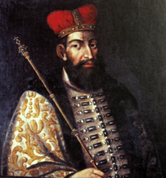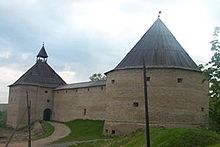- Narimantas
-
-
- For an earlier, historically unattested and possibly just a mythical namesake, see Palemonids
Narimantas or Narymunt (baptized Gleb, born just before 1300 (according top Wasilewski 1992) – February 2, 1348) was the second eldest son of Gediminas, Grand Duke of Lithuania. During various periods of his life, he ruled Pinsk and Polatsk. In 1333 he was invited by Novgorod's nobles to rule and protect territories in the north, Ladoga, Oreshek and Korela.[1] He started the tradition of Lithuanian mercenary service north of Novgorod on the Swedish border that lasted until Novgorod's fall to Moscow in 1477.[2]
About 1338, Golden Horde took him as prisoner. The Muscovite ruler, Ivan Kalita, ransomed him from Tatars, keeping him as hostage in Moscow for a few years.
Narimantas supported his brother Jaunutis when he was deposed by Algirdas and Kęstutis in 1345. In order to avoid getting killed by his younger brothers, he escaped Vilnius in autumn 1344. Narimantas travelled to Jani Beg, Khan of the Golden Horde, asking for support against Algirdas. Though he failed to solicit support, he is rumoured to have married a Tatar princess.[3] (possibly as second wife.) After returning, Narimantas reconciled with Algirdas and was killed leading the Battle of Strėva against the Teutonic Knights on February 2, 1348. His descendants include Princes Kurakin, Galitzine, Khovansky, Korecki.[1]
He took baptism in 1333 in or before Veliki Novgorod. This made him ineligible to succeed his father as ruler of Lithuanians, despite his primogeniture right.
sources: T.Wasilewski, 1992
Sons
It is believed that Narimantas had five sons:[4]
- Aleksander (died after 1386), Prince of Podolia
- Yury (died in 1392), Prince of Belz
- Nikolai, Prince of Pinsk
- Patrikas (died ca. 1387), Prince of Starodub
- Simeon (died after 1386)
The Polish genealogist and historian Jozef Puzyna (see Dr. Jozef ks. Puzyna, article series on Narimantas, in: Miesiecznik Heraldyczny, 1930-31) refutes strongly the claim that Narimantas' progeny would gave been born of a Tatar wife. He advances a hypothesis that the names of Narimantas' sons indicate that their mother was an Orthodox Ruthenian lady.
References
- ^ a b (Lithuanian) Kiaupa, Zigmantas (2004). "Narimantas". In Vytautas Spečiūnas. Lietuvos valdovai (XIII-XVIII a.): enciklopedinis žinynas. Vilnius: Mokslo ir enciklopedijų leidybos institutas. pp. 42. ISBN 5-420-01535-8.
- ^ Rowell, C. S. (1994). Lithuania Ascending: A Pagan Empire Within East-Central Europe, 1295-1345. Cambridge Studies in Medieval Life and Thought: Fourth Series. Cambridge University Press. p. 175. ISBN 9780521450119.
- ^ Rowell, C. S. Lithuania Ascending, 114
- ^ Rowell, C. S. Lithuania Ascending, xxxii
- Sjöström (2011), Liettuan gediminidien suomensukuiset geneettiset juuret. ISSN 1239-3487, Donelaitis - Donelaitis-seuran - Liettuan Ystävät ryn lehti 1/2011, ss 16..18
See also
- family of Gediminas – family tree of Narimantas
- Gediminids
- List of Belarusian rulers
Categories:- 1270s births
- 1348 deaths
- Belarusian rulers
- Lithuanian nobility
- Belarusian nobility
- Ruthenian nobility
- Gediminids
- Military personnel killed in action
-
Wikimedia Foundation. 2010.


